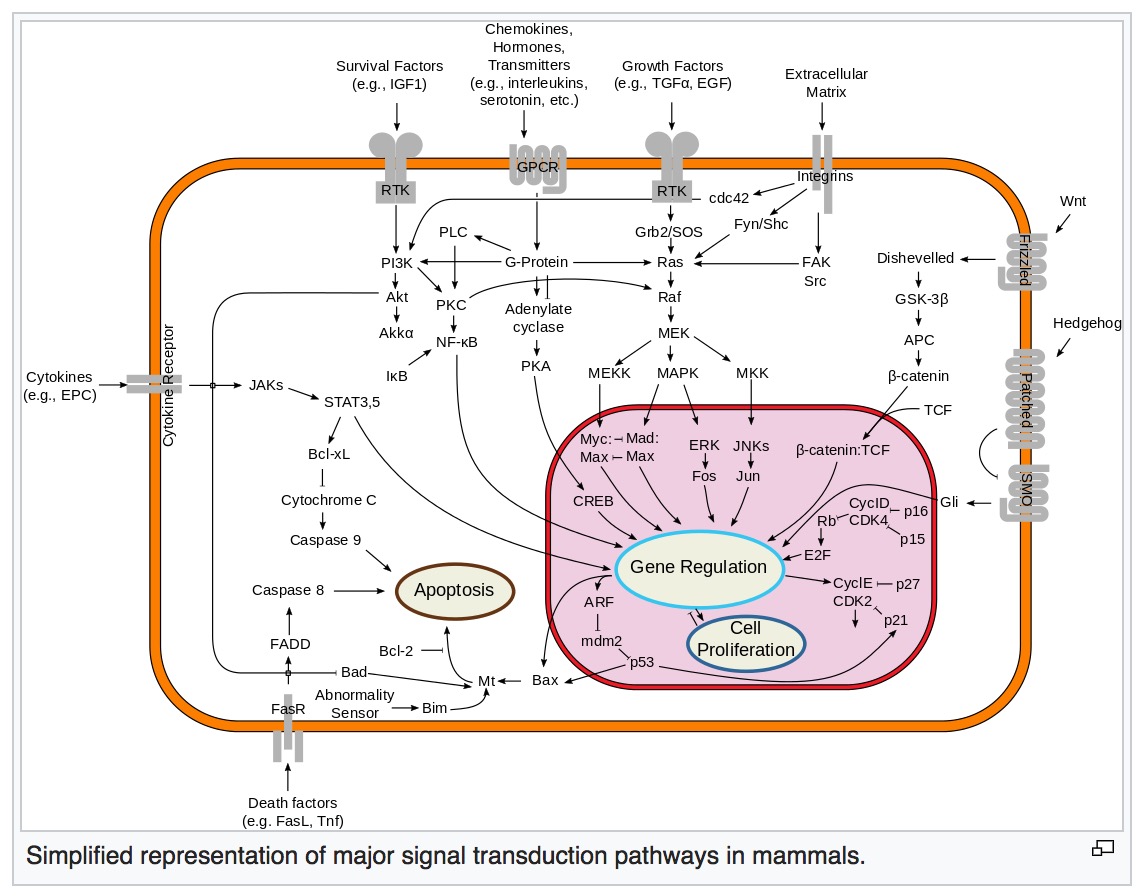GSK3
Glycogen synthase kinase 3 is a serine threonine protein kinase that mediates the addition of phosphate molecules onto serine and threonine amino acid residues. First discovered in 1980 as a regulatory kinase for its namesake, Glycogen synthase, GSK-3 has since been identified as a kinase for over forty different proteins in a variety of different pathways.
In mammals GSK-3 is encoded by two known genes, GSK-3 alpha (GSK3A) and GSK-3 beta (GSK3B). GSK-3 has recently been the subject of much research because it has been implicated in a number of diseases, including Type II diabetes (Diabetes mellitus type 2), Alzheimer's Disease, inflammation, cancer, and bipolar disorder.
Glycogen synthase kinase-3 (GSK-3) plays an important role in apoptosis, proliferation and cell cycle.
Glycogen synthase kinase 3 beta, also known as GSK3B, is an enzyme that in humans is encoded by the GSK3B gene.
In mice, the enzyme is encoded by the GSK-3β gene.
Glycogen synthase kinase-3 (GSK-3) is a proline-directed serine threonine protein kinase that was initially identified as a phosphorylating and an inactivating agent of glycogen synthase. Two isoforms, alpha (GSK3A) and beta, show a high degree of amino acid homology.
GSK3B is involved in energy metabolism, neuronal cell development, and body pattern formation.
Homozygous disruption of the GSK-3β locus in mice results in embryonic lethality during mid-gestation. This lethality phenotype could be rescued by inhibition of tumor necrosis factor.
GSK-3β regulates mTOR/p70S6K1 signaling pathway and inhibits glioma progression in vivo; its inactivation via p-GSK-3β (Ser9) is associated with glioma development, which is new mechanism that may be helpful in developing GSK-3β-based treatment of glioma in the future 1).
GSK3β may be the central hub for Valproic acid (VPA)-induced apoptosis and VPA can be further evaluated as a novel agent for glioma therapy 2).
Treatment with GSK3-inhibited Chimeric antigen receptor (CAR)-T cells resulted in 100% tumor elimination during the tumor-rechallenge experiment in GBM-bearing animals and increased accumulation of memory CAR-T cells in secondary lymphoid organs. These adjuvant-like effects of GSK3 inhibition on activated CAR-T cells may be a valuable adjunct to a successful implementation of CAR-T immunotherapy against GBM and other solid tumors 3).
A study of Acikgoz from Izmir focused on the effect of GSK-3 inhibitor IX in the glioblastoma cells. Apoptosis induction was determined by Annexin-V assay, multicaspase activity and immunofluorescence analyses. Concentration-dependent effects of GSK-3 inhibitor IX on the cell cycle were also evaluated. Moreover, the effect of GSK inhibitor on the cellular biomolecules was assessed by using ATR-FTIR spectroscopy.
The assay results indicated that GSK-3 inhibitor IX induces apoptosis, resulting in a significant increase in the expression of caspase-3 and caspase-8 proteins. Cell cycle analyses revealed that GSK-3 inhibitor IX leads to dose-dependent G2/M-phase cell cycle arrest. Based on the FTIR data, treatment of GBM cells causes dysregulation in the carbohydrate metabolism and induces apoptotic cell death which was characterized by the spectral alterations in nucleic acids, an increment in the lipid amount with disordering state and compositional changes in the cellular proteins. These findings suggest that GSK-3 inhibitor IX exhibits anti-cancer effects by inducing apoptosis and changing biomolecular structure of membrane lipids, carbohydrates, nucleic acids and proteins, and thus, may be further evaluated as a potential effective candidate agent for the GBM combination therapies 4).
